The Disruptive Octopus
How Seed Helped Ball Aluminum Cup® Leverage the 8 Tentacles of Disruptive Innovation to Drive Success
This article details how Seed Strategy helped the Ball Corporation turn an innovative product idea into a purpose-driven brand that successfully debuted at professional football’s biggest game—all within eight months. The national brand launch of the Ball Aluminum Cup® resulted in a 4x increase in website traffic and featured a campaign credited with driving 60% of Amazon sales. Less than a year later, the product rolled out to 18,000 stores nationwide and in 2020, Fast Company recognized it as a “World Changing Idea.”
There’s no shortage of brands seeking to launch disruptive innovation, but many are short on the resources and experience required to tackle such a unique and ambitious endeavor.
That’s where Seed comes in. Our eclectic yet purposefully constructed cast of experts has the wide-ranging knowledge, skills and experience it takes to bring truly disruptive innovation to market. In fact, many clients rely on us to serve as their full-service marketing partner, to support disruptive entrepreneurial ventures within their larger organizations. This allows us to not only help them achieve their goals, but also instill a lasting culture of innovation within the company.
An Intro to the 8 Tentacles of Disruptive Innovation
Through our work on countless disruptive innovation initiatives, we’ve identified 8 key tentacles—or practices—that can be strategically and creatively leveraged to drive success.
1. Critical Foundational Learning and Analysis
2. Channel and Business Model Innovation
3. Category Domination Strategy and Execution
4. Rapid Ideation and Alignment
5. Partnership Innovation
6. Infusion of Entrepreneurial Passion
7. Test Market Transactional Learning
8. Future-Forward Brand Communication and Experience Testing
We use the unique talents from our team and these 8 tentacles to help brands win with disruptive innovation, regardless of the category they operate in.
Sounds great, right? But what does that actually look like? Let’s take a peek behind the scenes at a real-world example of how the Seed team helped a client weather the waves of adversity and launch an offering that made a huge splash in the marketplace.
Background: How Seed Helped Launch the Ball Aluminum Cup®
Seed Strategy was called upon to become part of an entrepreneurial team that would launch the Ball Corporation’s first B2C product since the Mason jar—the Ball Aluminum Cup®. This new competitor to plastic disposable cups features a sleek, modern design and most importantly, is made with 100% infinitely recyclable aluminum, making it a far more environmentally friendly choice consumers can feel great about.
The Seed team was tasked with providing a well-researched basis of interest then helping translate the idea into a growing business with ongoing marketing support, all in less than a year.
Here’s a look at how we leveraged the talents of our multi-faceted team and the 8 tentacles of disruptive innovation to make it happen.
Tentacle 1: Critical Foundational Learning and Analysis
Challenge: The Ball Aluminum Cup® team needed to answer key foundational questions about the product (the target, core insight, most appealing benefits and RTBs, etc.) and use that information to validate the business case, formulate a launch plan and justify a multimillion-dollar investment in a new manufacturing plant—all in less than 30 days.
Action: Powered by the research expertise of Burke, Inc. (Seed’s parent company), the Seed + Burke team applied its collective expertise in research, brand strategy and strategic analysis to design research and blend data from multiple research streams into a comprehensive recommendation—including the business case and launch plan best suited to utilize the capabilities of the proposed new manufacturing facility.
Results: Seed + Burke’s agile approach to research and analysis identified target channels, produced consumer insights that illuminated audience targets (consumer and operator), built the rationale to support the capital investment required to build the new manufacturing facility, and validated an iterative B2B and B2C launch plan based on transactional learning through in-market pilots.
Tentacle 2: Channel and Business Model Innovation
Challenge: The Ball team was used to working with business models that fit the organization’s B2B aluminum packaging business, but those weren’t applicable to the Ball Aluminum Cup®. Unlike the company’s aluminum cans and bottles, the Ball Aluminum Cup® would get a large percentage of its sales from the B2C channel. It would also carry a more premium price and be used differently. This meant that the right business model would have to help consumers see the value of using, refilling and recycling the cup.
Action: Seed leveraged its expertise in channel and business-model innovation to successfully overcome the product’s potential pricing and usage barriers.
The initial business model focused on the on-premise channel, primarily sports and entertainment venues. This strategy provided trial to an audience that was less price sensitive—and to venues that saw the cup as a low-impact way to meet sustainability goals and requirements. It also put the product in an environment where people are used to disposing and recycling their cups after usage.
When COVID-19 halted most on-premise events, the team had to shift gears and accelerate its retail launch strategy. The group knew retail success was even more heavily dependent on establishing proper usage behavior—getting people to use the cup, refill it a few times, and then recycle it—and that this would require breaking the consumer tension between disposability and premium value (in other words, people don’t usually throw away premium-priced items they value).
The answer came in the form of a commercial idea. The team discovered that using the context of parties—beginning with COVID-friendly virtual happy hours and get-togethers—would provide the same benefits it sought from on-premise venues. (At parties, people are less price sensitive, expect a premium experience and are used to disposing of cups.) Further, this approach allowed them to scale the message to align with the changing sentiment around social interaction.
Results: The unique business model removed the barriers stemming from the premium price point and consumer behavior change and leveraged the only disposable cup model that touted refill and reuse. Additionally, Seed’s commercial idea provided the brand with multiple creative executions, all anchored by a consistent message.
Tentacle 3: Category Domination Strategy and Execution
Challenge: The team was focused on navigating a successful path to market, but it didn’t want the Ball Aluminum Cup® to be just another option in the category once it got there. The goal was to go from being a new entrant to a category leader in a short period of time.
Action: The team recognized that the category had little activity or transformational innovation, but knew it had significant potential. Because of the disposable nature of the category, current players relied on a value-based product positioning. And, despite the groundswell of anti-plastic sentiment, all major competitive products were made of plastic.
Seed identified the white space in the disposable cups category in retail and developed a strategy that would allow the Ball Aluminum Cup® to occupy it—positioning the product as a more environmentally friendly offering that delivers on both value (refillable and infinitely recyclable) and quality (sleek look, lightweight yet sturdy design, superior cold-drink experience). Seed paired this strategy with clear communication and strong media targeting/placement to maximize its impact.
Results: Major retailers credited the Ball Aluminum Cup® with bringing new consumers to the disposables aisle. Within a few short months, the cup also became the best-selling product in the disposable cups category on Amazon. Additionally, it helped FSOP (foodservice on-premise) operators meet sustainability goals and grow on-premise beverage sales at key events that resumed after COVID-19 restrictions were eased.
Tentacle 4: Rapid Ideation and Alignment
Challenge: The Ball Aluminum Cup® team operated within a large corporation, but it would have to act like an agile startup in order to thrive.
Action: Seed and the Ball Aluminum Cup® team partnered to execute an agile, startup-style work plan. A series of sprints were supported by short, focused weekly meetings where big decisions were made and problems were addressed in real time. Team members collaborated to ideate, plan and identify actions and responsible parties. The group ran pilots to test theories, adjust strategy and get enough information to move onto the next bigger pilot.
Results: The team’s agile approach empowered the brand to make significant accomplishments in an accelerated timeframe and enabled a critical pivot in strategy when COVID-19 hit.
The commitment to rapid innovation and alignment also allowed the brand to ideate and take advantage of unique, unplanned marketing opportunities, like having a presence at the Big Game, incorporating celebrity endorsement into the product’s ad campaign, leveraging momentum from celebrities and social media influencers who used the cup, and acquiring premium ad placement during the Oscars and the Thanksgiving Day parade. These endeavors helped grow brand awareness from 0.6% to 20% in just a few months.
Tentacle 5: Partnership Innovation
Challenge: The team needed to boost awareness and acquire important learning in advance of a full-scale launch, but compressed timelines required innovative methods (tapping into the power of partnership) to do so.
Action: Seed helped identify potential new external partnerships as well as existing corporate partnerships that the Ball Aluminum Cup® team could leverage to boost awareness and create a transactional launch-and-learn program. The Seed team then crafted a strategic plan evaluating the ROI, benefit structure and strategic fit of specific partnerships, culminating in recommendations and creative ideas to promote the cup within the context of each partnership.
The team also worked with groups across the Ball organization to strategically assess the potential purchase of naming rights for a professional sports arena.
Results: Seed’s work provided the foundation Ball needed to form strategic partnerships that would enable a customized pilot testing program. The Seed team also facilitated successful partnerships with several key social media influencers to help build awareness and a social media following in advance of the product launch. Finally, Seed supported the Ball Corporation endeavor to pursue the arena naming rights deal, resulting in a significant visibility/awareness boost for the company and the Ball Aluminum Cup®.
Tentacle 6: Infusion of Entrepreneurial Passion
Challenge: Ball had ambitious objectives for the Ball Aluminum Cup®, but with a lean internal team, the organization needed a boost of additional creative and strategic horsepower to reach its goals.
Action: Seed custom-assembled a team made up of industry veterans and marketing visionaries with backgrounds and skillsets matched to the needs of the job at-hand. The group became an extension of the Ball Aluminum Cup® team, where it established a looping system of feedback and iteration with an eye to the strategic goal. The group worked shoulder to shoulder with the Ball team on short- and long-term planning while also responding to day-to-day needs.
Results: Acting as an adjunct marketing department, Seed was able to add a vast array of capabilities within the Ball Aluminum Cup® team at a moment’s notice. This collaborative partnership built a culture of innovation within the Ball Aluminum Cup® brand and gave its small team the flexibility it needed to keep moving forward while taking its time to slowly and purposefully expand its ranks. As the Ball Aluminum Cup®team grew, Seed team members flexed to fill other gaps—operating much like a startup.
Tentacle 7: Test Market Transactional Learning
Challenge: Laying the groundwork for long-term success required first obtaining several key learnings. Specifically, the team needed to identify the most appealing sales proposition for the product, determine how the marketing and sales ecosystems would perform (media, communications, retail and foodservice/on-premise sales, etc.) and identify any unforeseen factors that could impact a successful widescale launch.
Action: Seed leveraged its broad capabilities in transactional learning to help plan, organize and support a series of strategic in-market test-and-learn pilots (two FSOP pilots at major sports arenas and two retail pilots in key markets) to get the answers the team needed.
Results: The pilots served as real-world models that allowed the team to test and refine media, creative messaging, advertising, package design and shopper marketing executions—providing the necessary template for a successful launch. Over the course of the test, the Ball Aluminum Cup® outperformed competitive items on shelf, over-delivering on the target set for sales per point of distribution. Less than six months after the successful test, the Ball Aluminum Cup® began shipping nationwide.
Tentacle 8: Future-Forward Brand Communication and Experience Testing
Challenge: Messaging is critical to the success of any new product launch, but the Seed team had to create and place communication that would accomplish multiple critical objectives. This included: building awareness, increasing trial, driving sales and educating consumers on the proper way to use the product and the sustainability benefits of switching from single-use plastic cups.
Action: The team knew it had to develop a compelling commercial idea to achieve this challenging multi-faceted communication objective. Leveraging Seed’s proven process for creating campaignable ideas, our team of strategists, writers and visual creatives worked together to identify the key insights and business objectives and then develop a central idea (including copy and imagery) that fit the strategy and could deliver the desired results.
Specifically, this central idea used the context of parties to mitigate barriers (premium price, reluctance to recycle the cups and buy new ones, etc.), convey an energetic and fun tone, and relay a clear, memorable message (enjoy, refill, recycle) that communicated both how to use the product and its sustainability benefits.
The team then developed the various creative elements that would bring the campaignable idea to life. This included writing the script, creating the storyboard, casting talent and directing/composing a custom soundtrack for the television spot and web videos, plus developing complementary banner ads and social media marketing components. All these elements became part of a customized media plan that Seed designed to maximize the impact of the messaging and the spend.
Results: Seed’s media plan and creative execution significantly increased both exposure and sales. The media plan resulted in 850MM impressions and tripled website traffic. Promotional videos were watched to completion over 50% of the time—far exceeding industry averages—while both Amazon and brick-and-mortar sales grew steadily following media investment.
At the end of the day, Seed helped Ball turn a unique product idea into a disruptive innovation and purpose-driven brand that was successfully introduced at professional football’s championship game—all within eight months. Less than a year later, the product rolled out to 18,000 stores across the country and in 2020, Fast Company recognized the Ball Aluminum Cup® as a “World Changing Idea.”
Contact Sean Smyth to learn more about how Seed can help with your next disruptive innovation effort.
Written by Eric Scheer and Adam Siegel.
Eric Scheer is President, Chief Strategy Officer at Seed Strategy where he leverages his rich experience as an entrepreneur, designer and strategist to expertly lead the agency and help clients achieve meaningful growth.
Adam Siegel is the Editor of The Accelerator and VP, Creative at Seed Strategy where he draws upon his diverse experience in advertising, research and innovation to craft breakthrough creative and winning copy.
Connect with us! Follow Seed Strategy on LinkedIn, Twitter, Facebook.

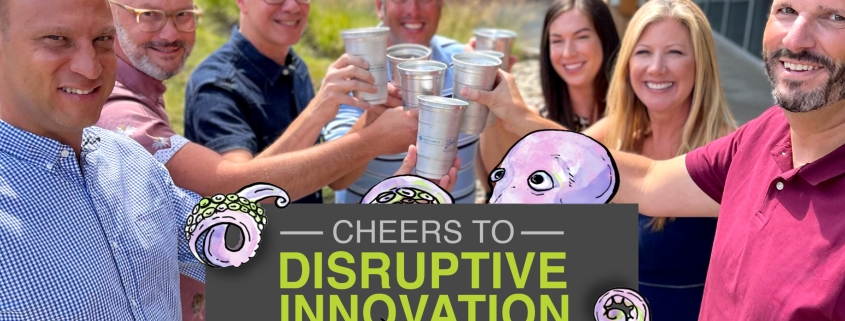
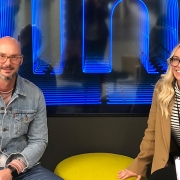

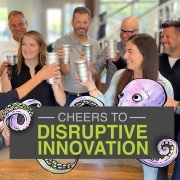

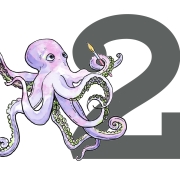
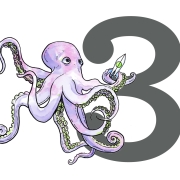
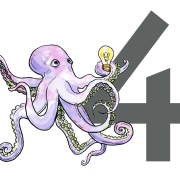
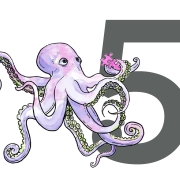


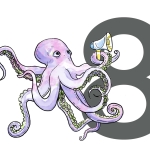
Trackbacks & Pingbacks
[…] be sure to check out our article on the 8 principles of disruptive innovation—and how they were used to help launch the Ball Aluminum […]
Comments are closed.